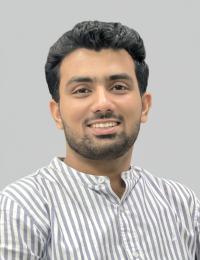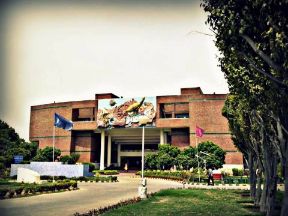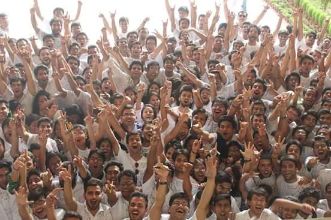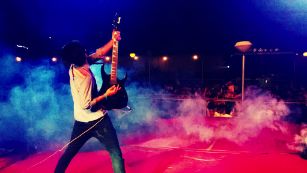
Dr. Saurabh Samuchiwal is an Assistant Professor in the Department of Biological Sciences & Engineering, specializing in sustainable environmental bioprocessing, industrial effluent treatment, and microbial technologies. His research focuses on developing innovative microbial consortium-based approaches for the treatment and recycling of textile and industrial wastewater, contributing towards Zero Liquid Discharge (ZLD) and circular economy practices. His work is closely aligned with the United Nations Sustainable Development Goals (SDGs) and supports the vision of Atmanirbhar Bharat by fostering indigenous, scalable, and cost-effective technologies.
Dr. Samuchiwal completed his PhD at IIT Delhi, where he developed a pilot-scale microbial technology (‘SMAART’) for efficient treatment of undiluted textile effluent under challenging industrial conditions, achieving >94% decolorization over one year. His expertise spans microbial acclimatization, microbial based products, and bioreactor design, integrated with life cycle assessment for sustainable process development. He has also worked extensively on algal-based carbon capture, bioenergy recovery, and resource recycling from industrial waste streams. He has published several research articles in reputed peer-reviewed journals and actively serves as a reviewer for leading international journals in bioresource technology, chemosphere, environmental management, environmental biotechnology, etc. Committed to advancing sustainable technologies, Dr. Samuchiwal is passionate about mentoring students, promoting industry-academia collaborations, and translating research into real-world applications that address environmental challenges while strengthening India’s self-reliance.
In recognition of his contributions, he has received several prestigious awards as mentioned below:
- Received Prof. T.K. Ghose Memorial Award for Best PhD thesis in Biochemical Engineering and Biotechnology at IIT Delhi.
- Received Prof. Mira Madan Memorial Excellence Award for Best PhD thesis in Biomass based rural development and technology at IIT Delhi
- Received “Distinction” in my Doctoral thesis from IIT Delhi (2023)
- Received “Young Scientist Award” from Microbiologists Society India (2023).
- Received “Best Translation Research Award” during Global-Bio India 2024 Roadshow by Birac and FITT, IIT Delhi
- Received best poster presentation award at "International Conference on Microbiological Research: Current Challenges and Future Perspectives", held at Trichy, Tamil Nadu
- CSIR NET AIR 64 (2024) and GATE AIR 96 (2017)
- Received “Environmentalist Award 2024” from Environment & Social Development Association.
Areas of Research and available Vacancies:
Water Sustainability & Environmental Bioprocessing: Industrial Effluent and Municipal wastewater treatment, Bioreactor designing and operations, scale-up study, Microbial strains isolation and acclimatization, Biomass valorization, industrial waste management and recycling, Environment impact assessment & Life cycle assessment, Treatment process modelling and simulation, Algal biorefinery, Pollutants removal, Zero liquid discharge, Bioenergy, Biofertilizer and Biofilter development for air pollution.
Areas of Interest: Industrial and domestic effluent treatment, Bioreactor designing, Applied microbiology, Life cycle assessment, Microbial product development, Algal (Micro-algae and Diatoms) technology, Biofuel
International Publications/Overall Publications:
- Samuchiwal, S., Gola, D., & Malik, A. (2021). Decolourization of textile effluent using native microbial consortium enriched from textile industry effluent. Journal of Hazardous Materials, 402, 123835. (I.F. 12.2; Elsevier)
- Samuchiwal, S., Mathur, M., Bhattacharya, A., Kalia, S., Khandare, R. V., & Malik, A. (2023). Mechanistic insights on enzyme mediated-metabolite cascade during decolourization of Reactive Blue 13 using novel microbial consortium. Environmental Pollution, 329, 121718. (I.F. 7.6; Elsevier)
- Samuchiwal, S., Naaz, F., Kumar, P., Ahammad, S. Z., & Malik, A. (2023). Life cycle assessment of sequential microbial-based anaerobic-aerobic reactor technology developed onsite for treating textile effluent. Environmental Research, 116545. (I.F. 7.7; Elsevier)
- Samuchiwal, S., Bhattacharya, A., & Malik, A. (2021). Treatment of textile effluent using an anaerobic reactor integrated with activated carbon and ultrafiltration unit (AN-ACF-UF process) targeting salt recovery and its reusability potential in the pad-batch process. Journal of Water Process Engineering, 101770. (I.F. 6.3; Elsevier)
- Samuchiwal, S., Vishwakarma, R., Singh, N. V., Kalia, S., Wadhawan, G., Ahammad, S. Z., & Malik, A. (2022). Integration of coagulation-flocculation process for improved solid–liquid separation of anaerobically treated textile effluent. Separation Science and Technology, 1-16. (I.F. 3.23; Taylor & Francis)
- Samuchiwal, S., Sahu, A., Selvaraju, K., Singh, S., & Malik, A. (2024). Unveiling the azo-reductase mechanism in Pseudomonas putida for efficient decolorization of textile Reactive dyes: an in-silico study. Journal of Biomolecular Structure and Dynamics, 1-14. (I.F. 5.23; Taylor & Francis)
- Singh, G., Samuchiwal, S., Hariprasad, P., & Sharma, S. (2022). Melioration of Paddy Straw to produce cellulase-free xylanase and bioactives under Solid State Fermentation and deciphering its impact by Life Cycle Assessment. Bioresource Technology, 360, 127493. (I.F. 9.7; Elsevier)
- Kumar, P., Samuchiwal, S., & Malik, A. (2020). Anaerobic digestion of textile industries wastes for biogas production. Biomass Conversion and Biorefinery, 1-10. (I.F. 4.06; Springer)
- Thawani, M., Hans, N., Samuchiwal, S., & Prajapati, S. K. (2018). Improved methane yield from wastewater grown algal biomass. Water Science and Technology, 78(1), 81-91. (I.F. 2.7; IWA)
- Naaz, F., Samuchiwal, S., Dalvi, V., Bhattacharya, A., Pant, K. K., & Malik, A. (2023). Hydrothermal liquefaction could be a sustainable approach for valorization of wastewater grown algal biomass into cleaner fuel. Energy Conversion and Management, 283, 116887. (I.F. 9.9; Elsevier)
- Nair, V. K., Sahu, A., Samuchiwal, S., Malik, A., Ghosh, P., & Butola, B. S. (2025). Phycocyanin from oxygenic photogranules: A feasible ecofriendly dye for cotton and silk fibers. Cleaner Materials, 100334. (I.F. 9.0; Elsevier)
- Kalia, S., Samuchiwal, S., Dalvi, V., & Malik, A. (2024). Exploring fungal-mediated solutions and its molecular mechanistic insights for textile dye decolorization. Chemosphere, 360, 142370. (I.F. 8.1; Elsevier)
- Kalia, S., Dalvi, V., Nair, V. K., Samuchiwal, S., & Malik, A. (2023). Hybrid electrocoagulation and laccase mediated treatment for efficient decolorization of effluent generated from textile industries. Environmental Research, 228, 115868. (I.F. 7.7; Elsevier)
- Vishwakarma, R., Dey, S., Samuchiwal, S., & Malik, A. (2023). A biphasic photobioreactor system for consecutive extraction of lipids and carotenoids from pre-hydrolysed microalgae and evaluation of its biodiesel potential. Environmental Research, 115681. (I.F. 7.7; Elsevier)
- Kalia, S., Samuchiwal, S., Dhaka, V., & Malik, A. (2023). Development and optimization of the dye removal process by Trichoderma reesei using starch effluent as a growth supplement. AQUA-Water Infrastructure, Ecosystems and Society, 72(3), 395-410. (I.F. 3.21; IWA)
- Nair, V. K., Selvaraju, K., Samuchiwal, S., Naaz, F., Malik, A., & Ghosh, P. (2023). Phycoremediation of Synthetic Dyes Laden Textile Wastewater and Recovery of Bio-Based Pigments from Residual Biomass: An Approach towards Sustainable Wastewater Management. Processes, 11(6), 1793. (I.F. 2.8; MDPI)
- Kalia, S., Naaz, F., Samuchiwal, S., & Malik, A. (2025). Augmentation of Laccase Production using Agro-Wastes Through Solid-State Fermentation and Elucidating Its Impact using Life Cycle Assessment. Waste and Biomass Valorization, 1-15 (I.F. 2.8; Springer).
- Nair, V. K., Sahu, A., Samuchiwal, S., Malik, A., Ghosh, P., & Butola, B. S. (2025). Phycocyanin from oxygenic photogranules: A feasible ecofriendly dye for cotton and silk fibers. Cleaner Materials, 100334. (I.F. 9; Elsevier)
Publication in Conferences:
- S. Samuchiwal, F. Naaz and A. Malik (2022). “Life cycle comparison of novel sequential microbial-based anaerobic-aerobic reactor technology (SMAART) with conventional activated sludge process for treatment of real textile effluent” poster presentation at the 2022 International Conference on Green Energy and Environmental Technology, held from july 27-29, 2022, Università degli Studi Niccolò Cussano, Rome, Italy. ID 40.
- S. Samuchiwal, A. Bhattacharya, and A. Malik. (2021). Development of integrated technologies for the treatment of textile effluent and simultaneous recovery of salt for textile application. International Conference on Biotechnology for Sustainable Agriculture, Environment and Health (BSAEH-2021) organized by Biotech Research Society of India, BRSI (April 04-08, 2021) held at JAIPUR (Rajasthan), India. pp. 309
- Samuchiwal,S, Kalia S, GolaD, MalikA. (2018). Alternative approach for textile wastewater treatment. Indo-Japan Bilateral Symposium on Future Perspective of Bioresource Utilization in North-Eastern Region (IJBS 17) held on February 01-04th, 2018, IIT Guwahati, India. pp. 96.
- Samuchiwal, S, Kalia S, GolaD, Malik.A. (2018). Wasteland plant seeds as nutrient source to sustain biological treatment of textile Wastewater. Advances in interdisciplinary microbiology: Perspectives from academia and industry held on March 13-14th, 2018, BCAS Delhi, India. pp.15.
- Samuchiwal, S, Kalia S, Gola D, Malik A, Ahammad Z S, (2017). Integration of Native Microbial Consortium with Alginate Beads for Dye Decolorization from Textile Effluents. Poster presented in Industry Day held on 23rd September, 2017 at Indian institute of Technology (IIT) Delhi.
- Kalia S, Samuchiwal, S, Gola D, Malik A, Ahammad Z S, (2017). Enzyme production potential of fungal species involved in dye resmoval. Poster presented in Industry Day held on 23rd September, 2017 at Indian institute of Technology (IIT) Delhi.



